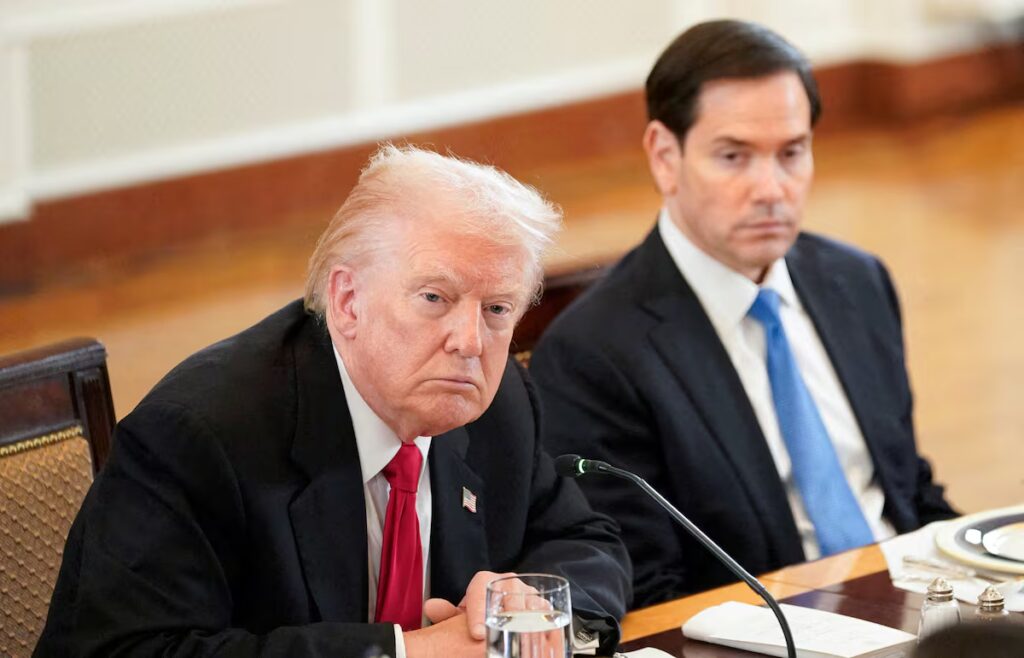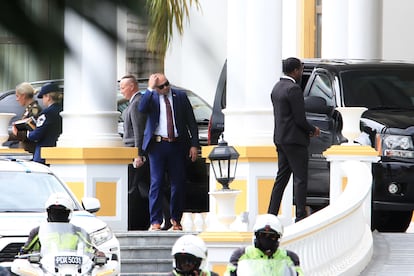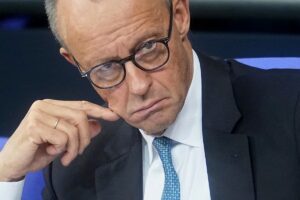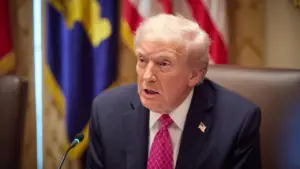
“When I have a problem, I call Marco. He solves it,” boasts Donald Trump of his secretary of state and national security adviser. This week, Marco Rubio is putting that reputation to the test. He is the key man on the two main international fronts in which the United States is currently engaged, and with two very different roles: in the negotiations on the war in Ukraine, he took the reins to balance what was initially a clearly pro-Russian proposal and try to push through a peace plan acceptable to Kiev; In the standoff with Venezuela, he is one of the driving forces of the maximum pressure policy against Nicolás Maduro.
It’s a situation with obvious rewards. If he succeeds on both fronts, the chameleonic U.S. diplomatic chief, who has skillfully channeled and adapted his boss’s positions – even when they contradict the ideas he espoused during his time in the Senate – could burnish his credentials with the president, a great admirer of decisive individuals. Trump has already mentioned his name, along with that of Vice President JD Vance, as possible successors starting in 2028. Avoiding a Russian-dictated peace plan for Ukraine would also earn him the gratitude of his European partners.
But at the same time, the Cuban-American politician runs the risk of a clash with the MAGA movement, which opposes foreign intervention. Its members would be furious at the prospect of a prolonged war in Eastern Europe. And they fear that the conflict in Venezuela could become one of the “endless conflicts” that Trump promised to avoid during his campaign.
The different positions are not limited to the basic level. They also extended to the Republican Party and the White House National Security team itself. Vance – with whom Rubio maintains an excellent personal relationship – has been a strong supporter of the pro-Russian peace proposal for Ukraine. One of the vice president’s closest allies, Army Secretary Dan Driscoll, who last week in Kiev tried to force President Volodymyr Zelenskiy’s acquiescence to the 28-point plan, was negotiating this Tuesday in Abu Dhabi with Russian and Ukrainian representatives, and will soon meet with the Ukrainians again. This Monday, Vance lashed out on social media at Republicans who criticized that proposal, which initially called for Ukraine to cede territories under its control to Russia and drastically reduce its military force.
For now, Rubio has achieved a victory thanks to the meeting in Geneva between a delegation led by him and a Ukrainian mission supported by the Europeans. “Over the past week, the United States has made tremendous progress toward a peace agreement by bringing Ukraine and Russia to the negotiating table. There are still some delicate, but not impossible, details to resolve that will require further talks between Ukraine and Russia,” White House spokeswoman Karoline Leavitt wrote on Tuesday. Trump, in turn, added Thursday, during the annual pre-Thanksgiving turkey pardoning ceremony: “We are very close to a deal.” The president announced that his special envoy, Steve Witkoff, will travel to Moscow to meet with Vladimir Putin.
This is a very different position from earlier last weekend, when the president warned that Zelenskiy would have to accept the peace plan apparently conceived after a meeting in Miami between White House special envoy Steve Witkoff, Trump’s son-in-law Jared Kushner, and Kirill Dmitriev, a close confidante of Russian President Vladimir Putin. Now the proposal has been reduced to 19 points; territorial concessions were eliminated and language banning Kiev from joining NATO was changed. The thorniest points, as Leavitt underlined, are left to subsequent negotiations. And the Thanksgiving ultimatum for acceptance is gone.
Flexibility in interviews
The person responsible for this change was Rubio. The US Secretary of State traveled to Geneva to conduct talks on Sunday with the Ukrainians and their European allies. His involvement introduced new flexibility into the negotiations. The proposal on the table, as he himself defined it, is “a living, breathing document” and, therefore, subject to change.
“Rubio simply understands better than many others in the current administration – none of whom are experts on Ukraine and very few of whom know anything beyond myths about Russia – that even in the difficult situation Ukraine finds itself in, there is simply no way the Ukrainian government can sign off on capitulation,” a senior European official told the online newspaper. Political.
Rubio, a Moscow hawk during his time as a senator, had already intervened on other occasions to correct the pro-Russian positions of Trump and his advisors. After the conversation with Russian Foreign Minister Sergei Lavrov, the President of the United States announced the cancellation of the summit scheduled with Putin in Budapest. In August he warned that the prospects for peace were “still a long way off” following the August meeting in Alaska between Trump and Putin.
Tension in Venezuela
Back in Washington and with an eye on the Abu Dhabi negotiations, Rubio will focus this week on the other major issue in U.S. foreign policy: the situation in Venezuela, where the Suns Cartel’s designation as a foreign terrorist organization took effect Monday. This designation refers to a group of senior officials linked to drug trafficking in the South American country. Washington accuses Maduro of leading this group.

The Secretary of State, always a supporter of the forced fall of Chavismo, was one of the main architects of the aggressive strategy of the United States, which maintains a massive deployment of military power in the international waters of the Caribbean under the pretext of fighting drug trafficking. Rubio had already pressured Trump during his first term to impose regime change in favor of opposition leader Juan Guaidó.
Rubio advocated regime change in the early months of the Trump administration, initially citing the human rights record and voter fraud. Initially, this met with little success. However, after taking over the leadership of the National Security Council, he presented a new thesis: that Maduro is a narco-terrorist leader, indicted by the Justice Department for alleged cocaine trafficking in 2020, during the first Republican term.
The former Florida senator, with his hard line against Maduro, ousted the special envoy for Venezuela, Richard Grenell, who was in favor of negotiations with Caracas that would open the doors to Venezuelan oil for US companies. Grenell was in contact with the Chavista regime during the first months of Trump’s presidency and also went there as part of the negotiations that led to the release of American prisoners and Caracas’ agreement to welcome Venezuelan citizens deported from the United States
In recent days, as Washington maintains its stalemate with Maduro and continues military preparations, Trump has flirted with diplomacy as a solution. The online newsletter Axios– the same one who leaked the initial plan for Ukraine – says the Republican intends to have direct talks with the Venezuelan president.
Rubio depends a lot on what happens, whether Trump ultimately opts for some kind of military action or dialogue. If Maduro remained in power, the Venezuelan leader could boast of having defeated the Republican administration twice, after the fiasco of his first term. And the support the former senator receives among Latin American exiles, especially in Florida, could take a hit. But if the Chavista leader falls, the South American country could find itself in an even more dangerous situation of instability.
Sign up to our weekly newsletter to get more English-language news coverage from EL PAÍS USA Edition




